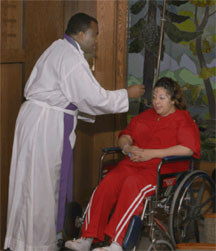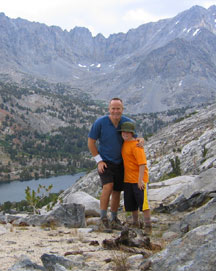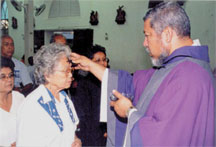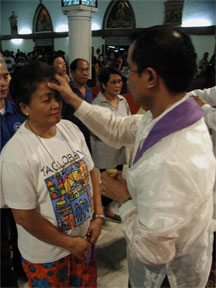AshAsh Wednesday; Meaning of Ash Wednesday; Ash Wednesday Practices
Ash Wednesday:
Practice and Meaning
by Rev. Dr. Mark D. Roberts
Copyright © 2009 by Mark D. Roberts
Note: You may download this resource at no cost, for personal use or for use in a Christian ministry, as long as you are not publishing it for sale. All I ask is that you give credit where credit is due. For all other uses, please contact me at mark@markdroberts.com.
Thank you.
What is Ash Wednesday?
Permalink for this post / Permalink for this series
Tomorrow is Ash Wednesday. As has been my tradition for several years, in today’s post I will explain some of the basics about this holy day. Tomorrow I’ll add some Ash Wednesday reflections.
What is Ash Wednesday? For most of my life, I didn’t ask this question, nor did I care about the answer. I, along, with most evangelical Christians in America, didn’t give Ash Wednesday a thought.
But then, in 2004, Ash Wednesday loomed large in American Protestant consciousness. Why? Because on that day Mel Gibson released what was to become his epic blockbuster, The Passion of the Christ. For the first time in history, the phrase "Ash Wednesday" was on the lips of millions of evangelical Christians, not just Catholics and other "high church" Protestants, as we anticipated the official release of The Passion.
I grew up with only a vague notion of Ash Wednesday. To me, it was some Catholic holy day that I, as an evangelical Protestant, didn't have to worry about, thanks be to God. In my view, all of “that religious stuff” detracted from what really mattered, which was having a personal relationship with Jesus Christ. In my early evangelical years it never dawned on me that some of “the religious stuff” might actually enrich my faith in Christ.
 During the spring of 1976, my first year of college, I was startled to see a woman who worked in my dining hall with a dark cross rubbed on her forehead. At first I wondered if it were a bizarre bruise. Then I noticed other women with similar crosses. It finally dawned on me what I was seeing. Here was my introduction to Ash Wednesday piety. These women, who were are Roman Catholic, had gone to services that morning and had ashes placed on their foreheads. I felt impressed that these women were willing to wear their ashes so publicly, even though it seemed a rather odd thing to do. It never dawned on me that this would be something I might do myself one day. During the spring of 1976, my first year of college, I was startled to see a woman who worked in my dining hall with a dark cross rubbed on her forehead. At first I wondered if it were a bizarre bruise. Then I noticed other women with similar crosses. It finally dawned on me what I was seeing. Here was my introduction to Ash Wednesday piety. These women, who were are Roman Catholic, had gone to services that morning and had ashes placed on their foreheads. I felt impressed that these women were willing to wear their ashes so publicly, even though it seemed a rather odd thing to do. It never dawned on me that this would be something I might do myself one day.
Fast forward sixteen years, to the spring of 1992. During my first year as Senior Pastor of Irvine Presbyterian Church, I learned that this church had a tradition of celebrating Ash Wednesday with a special worship service. It included the "imposition of ashes" on the foreheads of worshippers. I, as the pastor, was expected to be one of the chief imposers! So I decided it was time to learn about the meaning of Ash Wednesday. I wanted to be sure that the theological underpinnings of such a practice were biblically solid, and that it was something in which I could freely participate.
Here’s some of what I learned . . . .
Ash Wednesday is a Christian holiday (holy day) that is not a biblical requirement (rather like Christmas and Easter). Nevertheless, it has been honored by Christians for well over ten centuries at the beginning of Lent, a six-week season of preparation for Easter. In the earliest centuries, Christians who had fallen into persistent sin had ashes sprinkled on their bodies as a sign of repentance, even as Job repented "in dust and ashes" (Job 42:6). Around the tenth century, all believers began to signify their need for repentance by having ashes placed on their foreheads in the shape of a cross. Notice: even this sign of sinfulness hinted at the good news yet to come through its shape. Ash Wednesday is not some dour, depressing holy day because it symbolically anticipates Good Friday and Easter.
Today, celebrations of Ash Wednesday vary among churches that recognize this holiday. More and more Protestant and even evangelical churches hold some sort of Ash Wednesday services. At Irvine Presbyterian Church, where I served for sixteen years as pastor, and at St. Mark Presbyterian Church in Boerne, Texas, where I now attend, ashes are placed on our foreheads as a reminder of our mortality and sinfulness. The person who imposes the ashes quotes something like what God once said to Adam after he had sinned: "You are dust, and to dust you shall return" (Gen 3:19). This is the bad news of our sinfulness that prepares us to receive the good news of forgiveness in Christ.
 What I value most about Ash Wednesday worship services is the chance for us all to openly acknowledge our frailty and sinfulness. In a world that often expects us to be perfect, on Ash Wednesday we freely confess our imperfections. We can let down our pretenses and be truly honest with each other about who we are. We all bear the mark of sin, from the youngest babies to the oldest seniors. We all stand guilty before a holy God. We all are mortal and will someday experience bodily death. Thus we all need a Savior. What I value most about Ash Wednesday worship services is the chance for us all to openly acknowledge our frailty and sinfulness. In a world that often expects us to be perfect, on Ash Wednesday we freely confess our imperfections. We can let down our pretenses and be truly honest with each other about who we are. We all bear the mark of sin, from the youngest babies to the oldest seniors. We all stand guilty before a holy God. We all are mortal and will someday experience bodily death. Thus we all need a Savior.
Perhaps one of the greatest benefits of Ash Wednesday is that it begins the season of Lent. This is also a foreign concept for many evangelical Christians. In a couple of days I’ll weigh in on the meaning and benefit of Lent. Tomorrow I’ll stay focused on Ash Wednesday.
Staring Death in the Face (2009)
Permalink for this post / Permalink for this series
The denial of death . . . it’s all around us. When people die, they are often alone, sequestered in hospitals far away from the sad eyes of friends and family. If someone happens to die at home, the corpse is quickly sent away from the grieving relatives. In polite society one doesn’t talk much about death. And when it’s necessary to say something that has to do with dying, nifty euphemisms keep us from confronting the brute facts. When I lived in California, people would say, "Uncle Fred passed away." In Texas, for some reason, people are more succinct, saying, "Uncle Fred passed."
Of course our own fears concerning our own demise match our cultural squeamishness about death. We don’t want to think about our own mortality, and we do many things to pretend that its not approaching. We dye our graying hair. We cover our age spots with make up. We get cosmetic surgery to preserve the image of youth. Rarely do we seriously think about our own death. As a pastor, I’m amazed at how unusual it is for someone to make plans for his or her own memorial service, or even to leave notes for the family. These are things we’d rather not have to bother with.
I'm reminded about a story told by my friend Tim, who was a restaurant manager. Part of his job was to explain the company's benefit package to his new employees. One time, Tim hired a young man who didn't speak English very well because he had recently immigrated to the United States. Tim explained the vacation policy, sick leave, and health insurance, all without incident. Then he came to the life insurance. He showed that if the employee died, his family would get $25,000.
At this point the employee had a shocked look on his face, and said, "No, no, Tim!"
Tim wasn't sure he had been clear, so he explained, once again, "Look, if you die, your family will get $25,000."
Again, the employee was unhappy. "No, I don't want it," he said urgently.
"Why not?" Tim asked. "If you die, this will be good for your family."
"But Tim," the employee cried, "I don't want to die!"
Ash Wednesday is a day when we stare death in the face. Christians who observe this holiday get ashes “imposed” on their foreheads, while a minister or lay church worker says, “You have come from dust, and to dust you will return.” In other words, “You are going to die. And here are some ashes to remind you, just in case you’ve forgotten.”
For sixteen years of Ash Wednesday services at Irvine Presyyterian Church, I put ashes on the heads of older adults, some of whom had serious cancer and didn't live much longer. I also put tiny black crosses made of ash on the foreheads of babies far too young to realize what was happening to them. I imposed ashes on teenagers and senior citizens, on men and women, on boys and girls. All of these I reminded of their mortality, and they freely received the reminder. "You are dust," I said, implying, "You are going to die."
 What gives us such freedom to think about death? Are we Christians morose? Do we have some peculiar fascination with dying? I don’t think so. Rather, what allows us to stare death in the face is the assurance of life, real life, eternal life. When we know our lives are safe in the hands of God, and that this physical life is just the beginning of eternity, then we’re free to be honest about what lies ahead for us. We can face death without fear or pretending, because we know the One who defeated death. What gives us such freedom to think about death? Are we Christians morose? Do we have some peculiar fascination with dying? I don’t think so. Rather, what allows us to stare death in the face is the assurance of life, real life, eternal life. When we know our lives are safe in the hands of God, and that this physical life is just the beginning of eternity, then we’re free to be honest about what lies ahead for us. We can face death without fear or pretending, because we know the One who defeated death.
I’ll never forget my last visit with a dear member of my congregation named Helen. She was a tiny woman when healthy, but old age and disease had ravaged her body. I wouldn’t be surprised if she weighed 75 pounds on the day of my last visit.
There was no question that Helen was soon to die. And there was no point for me to pretend as if that weren’t true. So I asked her straightaway: “Helen, it’s obvious that you don’t have too much time left in this body. How are you feeling about dying?”
“Mark,” she said with a weak but confident voice, “I’ve lived a good, long life. I’ve been blessed far beyond what I could have hoped. You’re right, my body is giving out. I don’t have much longer to live. But I want you to know that I am ready. I’m not afraid. I’m eager to see my Lord. I hope I get to soon.”
Talk about staring death in the face! What gave Helen such unusual bluntness and boldness when it came to her own imminent death? Her faith in God. Her confidence that her life was really just beginning. Her assurance that her soul was safe in the hands of a gracious, loving God.
And so it is for Christians on Ash Wednesday. We can face death. We can admit our own mortality. We can talk openly about the limits of this life. Why? Because we know that through Christ we have entered into life eternal, the fullness of life that will not end when our bodies give out.
 The emotional result of Ash Wednesday observance isn’t depression or gloom, but gratitude and new energy for living. When we realize how desperately we need God, and how God is faithful far beyond our desperation, we can’t help but offering our lives to him in fresh gratitude. And when we recognize that life doesn’t go on forever, then we find new passion to delight in the gifts of each and every day, and to take none of them for granted. The emotional result of Ash Wednesday observance isn’t depression or gloom, but gratitude and new energy for living. When we realize how desperately we need God, and how God is faithful far beyond our desperation, we can’t help but offering our lives to him in fresh gratitude. And when we recognize that life doesn’t go on forever, then we find new passion to delight in the gifts of each and every day, and to take none of them for granted.
One year, as I returned to my seat after imposing ashes upon dozens of worshipers, I sat next to my 12-year-old son. I couldn’t help but notice the prominent black cross on his forehead, placed there by another leader. All of a sudden it hit me that my dear boy will die someday. Though I knew this in principle, I had never really thought about it before. My boy won't live forever. His life, like mine and that of every other human being, will come to an end. At that moment I prayed that God would give Nathan a long and blessed life. And then I hugged him for a good minute, treasuring the life we share together.
How grateful I am for the grace of God that allows us to stare death in the face so we can live with greater passion and delight! And how thankful I am for a day that allows me to think about death so I can cherish life even more!
Dust in the Wind?
Posted at 11:55 p.m. on Tuesday, February 8, 2005
I close my eyes,
Only for a moment, and the moment's gone
All my dreams, pass before my eyes, a curiosity
Dust in the wind, all they are is dust in the wind.
Same old song, just a drop of water in an endless sea
All we do, crumbles to the ground, though we refuse to see
Dust in the wind, all we are is dust in the wind.
Don't hang on, nothing lasts forever but the earth and sky
It slips away, and all your money won't another minute buy.
Dust in the wind, all we are is dust in the wind.
Dust in the wind, everything is dust in the wind. |
When I was in college one of my favorite songs was “Dust in the Wind” by the band Kansas (1978). Part of what attracted me to the song was the haunting music (to head and watch a video of this song, click here). But the lyrics were equally haunting and unsettling. “Dust in the Wind” reminds me of the Old Testament Book of Ecclesiastes, in which we read”
[H]umans have no advantage over the animals; for all is vanity. All go to one place; all are from the dust, and all turn to dust again. Who knows whether the human spirit goes upward and the spirit of animals goes downward to the earth? So I saw that there is nothing better than that all should enjoy their work, for that is their lot; who can bring them to see what will be after them? (Eccles 3:19-22)
As a Christian I don’t share the hollow despair of “Dust in the Wind,” yet I am moved by its profound statement of what life without God would be like. Like Ecclesiastes, “Dust in the Wind” doesn’t proclaim the Christian gospel. But it does encapsulate the bad news that prepares us to hear the good news of what God has done in Christ. Apart from Jesus, “all we are is dust in the wind. Everything is dust in the wind.”
On Ash Wednesday we remember that we are dust. Of course we also realize that we are far more than merely dust. But Ash Wednesday gives us a chance to focus on our “dustiness,” if you will. It’s a day to remember the bad news of who we are apart from Christ so that we can begin to prepare for the great news of Good Friday and Easter.
 Though I grew up as an active Christian, I had very little idea of Ash Wednesday until I was well into my thirties. I always had thought of it as some arcane Catholic holiday that, thank God, we Protestants didn’t have to worry about. But in the last fifteen years I have come, not only to understand Ash Wednesday, but also to treasure its meaning. Though I grew up as an active Christian, I had very little idea of Ash Wednesday until I was well into my thirties. I always had thought of it as some arcane Catholic holiday that, thank God, we Protestants didn’t have to worry about. But in the last fifteen years I have come, not only to understand Ash Wednesday, but also to treasure its meaning.
Like Christmas, Ash Wednesday is a Christian holiday (holy day) that is not required in Scripture. So it’s nothing that all Christians must recognize. However, the day has been set apart by Christians for over a thousand years. It is the first day of Lent, a forty-day season of preparation for Holy Week and Easter. (I’ll say more about Lent in my next post.) For centuries Christians have had ashes placed on their foreheads in the shape of a cross. The ashes remind us of our mortality. As they are being “imposed” on our foreheads we hear the bad news from Ecclesiastes 3: “You’ve come from dust, and to dust you will return.” Yet, because the ashes are imposed in the shape of the cross, they also suggest the good news that is yet to come, that which will deliver us from eternal death.
Throughout my pastoral tenure at Irvine Presbyterian Church I’ve put ashes on hundreds of foreheads. It’s both a strange and a wonderful thing to do. It’s strange to tell people, in so many words, “You’re mortal and you’re going to die.” Yet it’s wonderful to remind people of why they need a Savior, and to invite them to begin getting ready for a deeper experience of God’s grace on Good Friday and Easter – even seven weeks before Holy Week begins.
I remember distinctly times when I have put ashes on the forehead of a dear member of my church who was nearing death. And I remember occasions when I have imposed ashes on the foreheads of newborn infants. The point is that, whether old or young, we are all mortal. We are all caught in death grip of sin. And we all need a Savior.
I’ve had some church members complain about our Ash Wednesday service as “a downer.” To be sure it is not joyous in the way of most worship services. Yet we don’t simply leave ourselves to wallow in our dusty mortality. We take extra time to pray for ourselves and for each other, remembering God’s mercy. And, though we don’t yet focus on the full good news yet to come, we do sing “Great Is They Faithfulness” as we remember God’s grace. Apart from God we are indeed “dust in the wind.” Yet into our dust God has breathed, not only the breath of earthly life, but also the breath of his Spirit. Thus Ash Wednesday’s vivid reminder of our mortality leads us, not to despair, but to hope. It points not to defeat, but to the coming victory of Easter.
Staring Death in the Face
Posted at 11:15 p.m. on Ash Wednesday, February 9, 2005
New version posted on Ash Wednesday 2009
 The denial of death . . . it’s all around us. When people die, they are often alone, sequestered in hospitals far away from the sad eyes of friends and family. If someone happens to die at home, the corpse is quickly sent away from the grieving relatives. In polite society one doesn’t talk much about death. And when it’s necessary to say something that has to do with dying, nifty euphemisms keep us from confronting the brute facts. “Dear Fred has passed on.” “Aunt Suzy is no longer with us.” The denial of death . . . it’s all around us. When people die, they are often alone, sequestered in hospitals far away from the sad eyes of friends and family. If someone happens to die at home, the corpse is quickly sent away from the grieving relatives. In polite society one doesn’t talk much about death. And when it’s necessary to say something that has to do with dying, nifty euphemisms keep us from confronting the brute facts. “Dear Fred has passed on.” “Aunt Suzy is no longer with us.”
Of course our own fears concerning our own demise fit match our cultural squeamishness about death. We don’t want to think about our own mortality, and we do many things to pretend that its not approaching. We dye our graying hair. We cover our age spots with make up. We get cosmetic surgery to preserve the image of youth. Rarely do we seriously think about our own death. As a pastor, I’m amazed at how unusual it is for someone to make plans for his or her own memorial service, or even to leave notes for the family. These are things we’d rather not have to bother with.
And then we come to Ash Wednesday, a day when we stare death in the face. Christians who observe this holiday get ashes “imposed” on their foreheads, while a minister or lay church worker says, “You have come from dust, and to dust you will return.” In other words, “You are going to die. And here are some ashes to remind you, just in case you’ve forgotten.”
In our Ash Wednesday services today I put ashes on the heads of older adults, some of whom have serious cancer and may not live much longer. I also put tiny black crosses made of ash on the foreheads of babies far too young to realize what was happening to them. I imposed ashes on teenagers and senior citizens, on men and women, on boys and girls. All of these I reminded of their mortality, and they freely received the reminder.
 What gives us such freedom to think about death? Are we Christians morose? Do we have some peculiar fascination with dying? I don’t think so. Rather, what allows us to stare death in the face is the assurance of life, real life, eternal life. When we know our lives are safe in the hands of God, and that this physical life is just the beginning of eternity, then we’re free to be honest about what lies ahead for us. We can face death without fear or pretending, because we know the One who defeated death. What gives us such freedom to think about death? Are we Christians morose? Do we have some peculiar fascination with dying? I don’t think so. Rather, what allows us to stare death in the face is the assurance of life, real life, eternal life. When we know our lives are safe in the hands of God, and that this physical life is just the beginning of eternity, then we’re free to be honest about what lies ahead for us. We can face death without fear or pretending, because we know the One who defeated death.
I’ll never forget my last visit with a dear member of my congregation named Helen. She was a tiny woman when healthy, but old age and disease had ravaged her body. I wouldn’t be surprised if she weighed 75 pounds on the day of my last visit.
There was no question that Helen was soon to die. And there was no point for me to pretend as if that weren’t true. So I asked her straightaway: “Helen, it’s obvious that you don’t have too much time left in this body. How are you feeling about dying?”
“Mark,” she said with a weak but confident voice, “I’ve lived a good, long life. I’ve been blessed far beyond what I could have hoped. You’re right, my body is giving out. I don’t have much longer to live. But I want you to know that I am ready. I’m not afraid. I’m eager to see my Lord. I hope I get to soon.”
Talk about staring death in the face! What gave Helen such unusual bluntness and boldness when it came to her own imminent death? Her faith in God. Her confidence that her life was really just beginning. Her assurance that her soul was safe in the hands of a gracious, loving God.
And so it is for Christians on Ash Wednesday. We can face death. We can admit our own mortality. We can talk openly about the limits of this life. Why? Because we know that through Christ we have entered into life eternal, the fullness of life that will not end when our bodies give out.
 The emotional result of Ash Wednesday observance isn’t depression or gloom, but gratitude and new energy for living. When we realize how desperately we need God, and how God is faithful far beyond our desperation, we can’t help but offering our lives to him in fresh gratitude. And when we recognize that life doesn’t go on forever, then we find new passion to delight in the gifts of each and every day, and to take none of them for granted. The emotional result of Ash Wednesday observance isn’t depression or gloom, but gratitude and new energy for living. When we realize how desperately we need God, and how God is faithful far beyond our desperation, we can’t help but offering our lives to him in fresh gratitude. And when we recognize that life doesn’t go on forever, then we find new passion to delight in the gifts of each and every day, and to take none of them for granted.
As I returned to my seat after imposing ashes upon dozens of worshipers, I sat next to my 12-year-old son. I couldn’t help but notice the prominent black cross on his forehead, placed there by another leader. All of a sudden it hit me that my dear boy will die someday. Of course I knew this in principle, but I hadn’t thought about it in years. At that moment I prayed that would give Nathan a long and blessed life. And then I hugged him for a good minute or more, treasuring the life we share together.
How grateful I am for the grace of God that allows us to stare death in the face so we can live with greater passion and delight! And how thankful I am for a day that allows me to think about death so I can cherish life even more!
What is Ash Wednesday? 
Part 3 of the series, Ash Wednesday: Practice and Meaning
Posted for Wednesday, February 6, 2008
(This is a revised version of my post on February 24, 2004)
Many Christians, mostly Protestants and independents, had never given Ash Wednesday a thought until four years ago. Then, in 2004, Ash Wednesday became a huge day in American Protestant consciousness. Why? Because on that day Mel Gibson released what was to become his epic blockbuster, The Passion of the Christ. For the first time in history, the phrase "Ash Wednesday" was on the lips of millions of evangelical Christians, not just Catholics and other "high church" Protestants.
I grew up with only a vague notion of Ash Wednesday. To me it was some Catholic holy day that I, as an evangelical Protestant, didn't have to worry about, thanks be to God. During the spring of my first year of college, I was startled to see a woman who worked in my dining hall with a dark cross on her forehead. At first I wondered if it were a bizarre bruise. Then I noticed other women with similar crosses. It finally dawned on me what I was seeing. Here was my introduction to Ash Wednesday piety. I felt impressed that these women were willing to wear her ashes so publicly, even though it seemed a rather odd thing to do. It never dawned on me that this would be something I might do myself one day.
Fast forward sixteen years. During my first year as Senior Pastor of Irvine Presbyterian Church, I learned that this church had a tradition of celebrating Ash Wednesday with a special worship service. It included the "imposition of ashes" on the foreheads of worshippers. I, as the pastor, was expected to be one of the chief imposers! So I decided it was time to learn about the meaning of Ash Wednesday. I wanted to be sure that the theological underpinnings of such a practice were biblically solid, and that it was something in which I could freely participate.
Ash Wednesday is a Christian holiday (holy day) that is not a biblical requirement (rather like Christmas and Easter!). Nevertheless, it has been honored by Christians for well over ten centuries at the beginning of Lent, a six-week season of preparation for Easter. In the earliest centuries, Christians who had fallen into persistent sin had ashes sprinkled on their bodies as a sign of repentance, even as Job repented "in dust and ashes" (Job 42:6). Around the tenth century, all believers began to signify their need for repentance by having ashes placed on their foreheads in the shape of a cross. Even this sign of sinfulness hinted at the good news yet to come through its shape.
 Today, celebrations of Ash Wednesday vary among churches that recognize this holiday. At Irvine Presbyterian Church, where I served for sixteen years as pastor, and at St. Mark Presbyterian Church in Boerne, Texas, where I now attend, ashes are placed on our foreheads as a reminder of our mortality and sinfulness. The person who imposes the ashes quotes something like what God once said to Adam after he had sinned: "You are dust, and to dust you shall return" (Gen 3:19). This is the bad news of our sinfulness that prepares us to receive the good news of forgiveness in Christ. Today, celebrations of Ash Wednesday vary among churches that recognize this holiday. At Irvine Presbyterian Church, where I served for sixteen years as pastor, and at St. Mark Presbyterian Church in Boerne, Texas, where I now attend, ashes are placed on our foreheads as a reminder of our mortality and sinfulness. The person who imposes the ashes quotes something like what God once said to Adam after he had sinned: "You are dust, and to dust you shall return" (Gen 3:19). This is the bad news of our sinfulness that prepares us to receive the good news of forgiveness in Christ.
What I value most about Ash Wednesday worship services is the chance for us all to openly acknowledge our frailty and sinfulness. In a world that often expects us to be perfect, we can freely confess our imperfections. We can let down our pretenses and be truly honest with each other about who we are. We all bear the mark of sin, from the youngest babies to the oldest seniors. We all stand guilty before a holy God. We all are mortal and will someday experience bodily death. Thus we all need a Savior.
Perhaps one of the greatest benefits of Ash Wednesday is that it begins the season of Lent. This is also a foreign concept for many evangelical Christians. In my next post I'll explain the meaning and practice of Lent, and why this can enrich your experience of God's grace in Christ.
|

